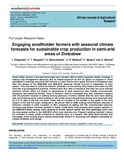Please use this identifier to cite or link to this item:
https://cris.library.msu.ac.zw//handle/11408/1634| Title: | Engaging smallholder farmers with seasonal climate forecasts for sustainable crop production in semi-arid areas of Zimbabwe | Authors: | Chagonda, Ignatius Mugabe, Francis T. Munodawafa, Adelaide Mubaya, C. P. Masere, P. |
Keywords: | Seasonal climate forecast, agriculture, smallholder farmers, adaptation, semi-arid areas. | Issue Date: | 2015 | Publisher: | Academic Journals | Series/Report no.: | African Journal of Agricultural Research;Vol. 10, No. 7; p. 668-676. | Abstract: | Small holder farmers in the semi-arid areas have not been able to utilize seasonal climate forecasts in making crop management decisions due to limited exposure as well as failure to interpret it. Three participatory meetings were held with farmers in Lower Gweru and Lupane Districts of Zimbabwe soon after the release of the 2008/2009 and 2009/2010 seasonal climate forecast in September of each season. This was done to solicit for farmers’ prediction of the coming rainy season and come up with field test crop management practices. Farmers have their sets of indicators that they rely on to forecast seasonal rainfall which are based on generations of past experience that include environmental, biological, and traditional beliefs. There is however, need to investigate how their indicators compare with the scientific forecast in making farming decisions. Farmers claimed that the rains were starting later and finishing earlier whilst analysis of the rainfall record showed that starting rains have been later by 5 to 10 days in the last five years. There was an increase in the number of dry spells in the rainy season in the last five years compared to the period 1980 to 2008. Adding recommended amounts of fertilizers resulted in yield increases of 40% compared to adding half the recommended amounts. Growing long season varieties resulted in higher yields (22%) than growing short season varieties in the 2009/2010 wetter season while growing of shorter season variety had yield advantage (36%) over the long season variety in the 2009/2010 which was relatively dry. Frequent weeding resulted in about 8% increase in maize yields compared to weeding once in a season. The study demonstrates that knowledge of the coming season assists smallholder farmers in coming up with adaptive strategies for climate variability and change. | URI: | http://hdl.handle.net/11408/1634 | ISSN: | 1991-637X |
| Appears in Collections: | Research Papers |
Files in This Item:
| File | Description | Size | Format | |
|---|---|---|---|---|
| African Journal of Agricultural Research1423750566.pdf | Full Text | 139.53 kB | Adobe PDF |  View/Open |
Items in MSUIR are protected by copyright, with all rights reserved, unless otherwise indicated.



